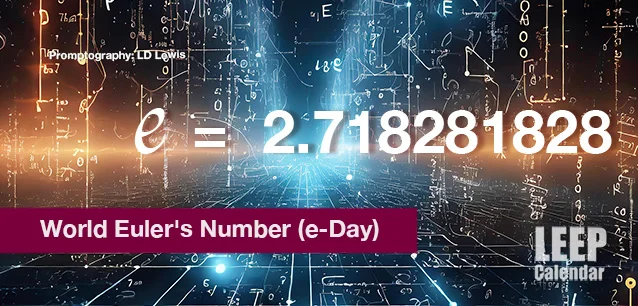 AD
AD
Today is: December 04
Scroll to explore events active on this date.
Additional Events on LEEP
LEEP INK FEATURES

August? Absolutely!
In August, we live through the Dog Days of Summer. It's hot and often humid, and those who can leave for better climates do. Down south, winter is in full force. August is also known as "the ...

In The Heat of July: July 2025 Events
Is it hot enough (or cold enough if you're below the equator) for you yet? There is actually a day for that! Like every month, I pick a diverse collection of events you may or may not know about. This ...

May Blooms: Events in May 2025
Along with October, May is one of the most densely packed months of the year. It's before the summer humidity and the last whole month of the school year. The weather is warming in t...
About World Euler's Number Day
Education
Ends: Jul 02, 2024
DESCRIPTION:
World Euler's Number Day (July 2nd) is a statistical event based on the calendar's date and marks a remarkable constant in mathematics, denoted as 'e.' While less widely recognized than Pi Day (March 14th) or Mole Day (October 23rd), two additional mathematical number days, Euler's Number Day still holds significance in the mathematical and educational communities. The day is observed globally on July 2nd (2/7), aligning with the number 'e,' equating to approximately 2.718. The United States observes it on February 7th. WHAT IS EULER'S NUMBER?
Euler's Number, named after the Swiss mathematician Leonhard Euler, is a fundamental mathematical constant. Euler, who made significant contributions in various areas of mathematics, was not the first to describe this number. Still, he was the one who started using the notation 'e' to represent it. The number 'e' first appeared in a work by John Napier, the inventor of logarithms, in the early 17th century. However, a Swiss mathematician, Jacob Bernoulli, discovered this constant while studying compound interest.
Euler's Number 'e' is irrational, meaning it cannot be expressed as a simple fraction, and its decimal representation goes on indefinitely without repeating. It is approximately equal to 2.71828 and is crucial in calculus, especially relating to growth and decay problems, and in more complex areas of mathematics like number theory and complex analysis.
'e' is also the base of natural logarithms, which makes it as fundamental in logarithmic calculations as pi (π) is in circular measurements.CELEBRATING EULER'S NUMBER DAY
Euler's Number Day is an opportunity for educators and mathematics enthusiasts to highlight the importance of mathematics in everyday life and to celebrate Euler's significant contributions to the field. Activities on this day often include educational workshops, mathematics competitions, and lectures on Euler's life and the applications of 'e' in various scientific and mathematical contexts. The day also inspires students and the public to delve into the beauty and complexity of mathematics, making abstract concepts like 'e' more accessible and engaging.
Euler's Number Day, though less renowned than other mathematical observances, is vital in promoting the wonders of mathematics. It commemorates a fundamental mathematical constant and honors the legacy of Leonhard Euler, one of the greatest mathematicians in history. The celebration of this day underscores the ongoing relevance and fascination of mathematical exploration and discovery.
VIDEOS
SUPPORTING DOCUMENTS
Currently, this event does not have supporting documents.
ADDITIONAL IMAGES
Currently, this event does not have supporting images.
Where would you like to go now?
 AD
AD


/footer-logo.svg)
